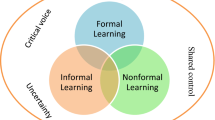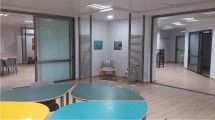Abstract
Research into students’ perceptions of their learning environments reveals the impact of these perceptions on the way students cope with these learning environments. Consequently, students’ perceptions affect the results of their learning. This study aims to investigate whether students in a new learning environment (NLE) perceive it to be more constructivist when compared with the perceptions students have of a conventional lecture-based environment. Using a questionnaire consisting of seven key factors of constructivist learning environments, the results show that students in the NLE perceive it to be more constructivist when compared to the perceptions of students in a conventional lecture-based environment. The difference was statistically significant for four of the seven factors. According to the effect size, as measured by the d-index, the difference in perception between the two groups was greatest for the factor ‘conceptual conflicts and dilemmas’.
Similar content being viewed by others
References
M.A. Albanese S. Mitchell (1993) ArticleTitleProblem-based learning: A review of literature on its outcomes and implementation issues Academic Medicine 68 52–81 Occurrence Handle10.1097/00001888-199301000-00012
D. Ausubel J. Novak H. Hanesian (1978) Educational psychology: A cognitive view EditionNumber2 Holt, Rinehart & Winston New York
H.S. Barrows (1996) Problem-based learning in medicine and beyond L. Wilkerson W.H. Gijselaers (Eds) Bringing problem-based learning to higher education: Theory and practice. New directions for teaching and learning Jossey-Bass Inc. Publishers San Francisco 3–13
M. Birenbaum (2003) New insights into learning and teaching and their implications for assessment M. Segers F. Dochy E. Cascallar (Eds) Optimising new modes of assessment: In search for qualities and standards Kluwer Academic Publishers Dordrecht 13–36
M. Brekelmans P. Eeden Particlevan den J. Terwel T. Wubbels (1997) ArticleTitleStudent characteristics and learning environment interactions in mathematics and physics education: A resource perspective International Journal of Educational Research 27 IssueID4 283–292 Occurrence Handle10.1016/S0883-0355(97)90010-0
M.W. Browne R. Cudeck (1993) Alternative ways of assessing model fit K. Bollen R. Stine (Eds) Testing structural equation models Sage Newbury Park, CA 136–162
J.S. Bruner (1959) ArticleTitleLearning and thinking Harvard Educational Review 29 184–192
J.S. Bruner (1961) ArticleTitleThe act of discovery Harvard Educational Review 3 21–32
E. Chernobilsky M.C. Dacosta C.E. Hmelo-Silver (2004) ArticleTitleLearning to talk the educational psychology talk through a problem-based course Instructional Science 32 319–356 Occurrence Handle10.1023/B:TRUC.0000026552.14289.2c
J. Cohen (1988) Statistical power analysis for the behavioral sciences EditionNumber2 Erlbaum Hillsdale, NJ
E. Corte ParticleDe (2000) ArticleTitleMarrying theory building and the improvement of school practice: A permanent challenge for instructional psychology Learning and Instruction 10 249–266 Occurrence Handle10.1016/S0959-4752(99)00029-8
J. Dewey (1910) How we think Health & Co Boston
J. Dewey (1944) Democracy and education Macmillan Publishing Co New York
F. Dochy M. Segers P. Bossche ParticleVan den D. Gijbels (2003) ArticleTitleEffects of problem-based learning: A meta-analysis Learning and Instruction 13 533–568 Occurrence Handle10.1016/S0959-4752(02)00025-7
F. Dochy M. Segers P. Bossche ParticleVan den K. Struyven (2005) ArticleTitleStudents’ perceptions of a problem-based learning environment Learning Environments Research 8 IssueID1 41–66 Occurrence Handle10.1007/s10984-005-7948-x
N.J. Entwistle H. Tait (1990) ArticleTitleApproaches to learning, evaluations of teaching, and preferences for contrasting academic environments Higher Education 19 IssueID2 169–194 Occurrence Handle10.1007/BF00137106
B.J. Fraser H.J. Walberg W.W. Welch J.A. Hattie (1987) ArticleTitleSyntheses of educational productivity research International Journal of Educational Research 11 145–252 Occurrence Handle10.1016/0883-0355(87)90035-8
S.B. Green N.J. Salkind (2003) Using SPSS for Windows and Macintosh. Analyzing and understanding data EditionNumber3 Pearson Education New Jersey
P. Goodyear N. Hativa (2002) Introduction: Research on teacher thinking, beliefs and knowledge in higher education N. Hativa P. Goodyear (Eds) Teacher thinking, beliefs and knowledge in higher education Kluwer academic publishers Dordrecht 1–13
F. Guay H.W. Marsh M. Boivin (2003) ArticleTitleAcademic self-concept and academic achievement: Developmental perspectives on their causal ordering Journal of Educational Psychology 95 IssueID1 124–136 Occurrence Handle10.1037/0022-0663.95.1.124
K.R. Harris P.A. Alexander (1998) ArticleTitleIntegrated, constructivist education: Challenge and reality Educational Psychology Review 10 IssueID2 115–127 Occurrence Handle10.1023/A:1022169018926
G.D. Hendry M. Frommer R.A. Walker (1999) ArticleTitleConstructivism and problem-based learning Journal of Further and Higher Education 23 IssueID3 359–371
M.M. Kennedy (1997) ArticleTitleThe connection between research and practice Educational Researcher 26 IssueID7 4–12 Occurrence Handle10.2307/1177124
R.E. Kirk (1996) ArticleTitlePractical significance: A concept whose time has come Educational and Psychological Measurement 56 746–759
S.J. Lea D. Stephenson J. Troy (2003) ArticleTitleHigher education students’ attitudes toward student-centred learning: Beyond ‘educational bulimia’? Studies in Higher Education 28 IssueID3 321–334 Occurrence Handle10.1080/03075070309293
W.A. Mehrens I.J. Lehmann (1991) Measurement and evaluation in education and psychology EditionNumber4 Holt, Rinehart & Winston Fort Worth
J.W. Pellegrino N. Chudowsky R. Glaser (2001) Knowing what students know: The science and design of educational assessment National Academy Press Washington, DC
J. Piaget (1954) The construction of reality in the child Basic Books New York
L.B. Resnick (1994) Situated rationalism: Biological and social preparation for learning L.A. Hirschfeld S.A. Gelman (Eds) Mapping the mind Cambridge University Press New York 474–494
C.R. Rogers (1969) Freedom to learn Charles E. Merill Publishing Company Colombus, Ohio
A.L. Russell D. Creedy J. Davis (1994) The use of contract learning in PBL S.E. Chen S.E. Cowdroy A.J. Kingsland M.J. Ostwald (Eds) Reflections on problem based learning Australian Problem Based Network Sydney 57–72
J.R. Savery T.M. Duffy (1995) ArticleTitleProblem-based learning: An instructional model and its constructivist framework Educational Technology 35 31–38
M. Segers (1996) Assessment in a problem-based economics curriculum M. Birenbaum F. Dochy (Eds) Alternatives in assessment of achievements, learning processes and prior learning Kluwer Academic Press Boston 201–226
M. Segers F. Dochy (2001) ArticleTitleNew assessment forms in problem-based learning: The value-added of the students’ perspective Studies in Higher Education 26 IssueID3 327–343 Occurrence Handle10.1080/03075070120076291
M. Segers F. Dochy E. Corte ParticleDe (1999) ArticleTitleAssessment practices and students’ knowledge profiles in a problem-based curriculum Learning Environments Research 12 IssueID2 191–213 Occurrence Handle10.1023/A:1009932125947
R.J. Simons J. Linden Particlevan der T. Duffy (2000) New learning: Three ways to learn in a new balance R.J. Simons J. Linden Particlevan der T. Duffy (Eds) New learning Kluwer Academic Publishers Dordrecht 1–20
Taylor, P.C. & Fraser, B.J. (1991). Development of an instrument for assessing constructivist learning environments. Paper presented at the annual meeting of the American Educational Research Association, New Orleans, LA.
P.C. Taylor B.J. Fraser D.L. Fisher (1997) ArticleTitleMonitoring constructivist classroom learning environments International Journal of Educational Research 27 293–302 Occurrence Handle10.1016/S0883-0355(97)90011-2
G. Tenenbaum S. Naidu O. Jegede J. Austin (2001) ArticleTitleConstructivist pedagogy in conventional on-campus and distance learning practice: An exploratory investigation Learning and Instruction 11 87–111 Occurrence Handle10.1016/S0959-4752(00)00017-7
P. Tynjälä (1999) ArticleTitleTowards expert knowledge? A comparison between a constructivist and a traditional learning environment in the University International Journal of Educational Research 33 355–442
S. Vosniadou (1996) ArticleTitleTowards a revised cognitive psychology for new advances in learning and instruction Learning and Instruction 6 95–109 Occurrence Handle10.1016/0959-4752(96)00008-4
E. Glaserfeld Particlevon (1993) Questions and answers about radical constructivism Tobin (Eds) The practice of constructivism in science education Lawrence Erlbaum Hildale, NJ 23–38
M. Windschitl (2002) ArticleTitleFraming constructivism in practice as the negotiation of dilemmas: An analysis of the conceptual, pedagogical, cultural, and political challenges facing teachers Review of Educational Research 72 IssueID2 131–175
Author information
Authors and Affiliations
Corresponding author
Additional information
in final form: 31 May 2005
Rights and permissions
About this article
Cite this article
Gijbels, D., van de Watering, G., Dochy, F. et al. New Learning Environments and Constructivism: The Students’ Perspective. Instr Sci 34, 213–226 (2006). https://doi.org/10.1007/s11251-005-3347-z
Received:
Accepted:
Issue Date:
DOI: https://doi.org/10.1007/s11251-005-3347-z




